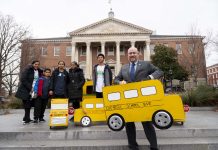When contracting for student transportation, school districts are finding savings and upgrades through trusted partnerships. Importantly, there are some different paths leading toward renewed fleets.
Some districts are building economies of scale through interdependencies of their own. In northeastern New Jersey, the Sussex County Regional Co-op has a $30 million budget for managing transportation contracts on behalf of 118 participating school districts. In total, the Co-op works with contractors to transport more than 10,000 students across counties on 809 total routes to 535 school destinations. It covers all special education, public, non-public, vocational-technical and charter students.
“In one year alone, 10 school districts saved over $1.2 million. That type of savings over the years will help control school taxes or redirect them back to the classroom,” said Amanda Ferrington, the Co-op’s director of transportation. “School district officials contact our agency to become members and they receive shared services, cost savings, safe and efficient pupil transportation services.”
Approximately 90 school bus contractors go through the Co-op’s bidding process, calling for vehicles that are six years old or newer. If a school district requires the installation of technology such as a GPS unit or camera systems on their buses, the solutions will be incorporated into the bid. The Co-op also offers its contractors two driver-aide training sessions every year.
“I feel our success is due to the fact that each of our staff cares deeply for children. We attempt to solve each issue with placing each child’s safety as the main concern,” added Ferrington.
In California, Hemet Unified School District acts as a public transportation agency for several districts in Los Angeles, Riverside and San Bernardino counties. With a $28 million budget, the organization has 49 contracts with school districts, 17 of which are full service agreements. Hemet acts as the “contractor” itself by operating 366 school buses, some powered by compressed natural gas, as well as maintaining equipment, integrating new technologies and training drivers.
“We define the level of service a district needs and work out a fixed price to operate and maintain vehicles. We help each other offset costs of transporting students,” said Michael Fogerty, director of transportation for Hemet Unified.
Good Relationships Go a Long Way When Renewing Fleets
Districts also reinvest in contracts with traditional contractors who offer partnerships, customized transportation services and upgraded bus features.
In February, Duval County School District in Florida invested in a new $187 million, 10-year contract with Student Transportation Inc., which will provide Jacksonville-area communities with over 230 new school buses equipped with air-conditioning and the latest safety and communications technologies. The contractor is busy getting ready for a summer start-up that will require recruiting, training, staffing and additional facilities.
The contract not only doubles Student Transportation’s size of North America operations, but gives the growing district more bus features, including two-point lap seat belts, three-camera digital recording systems, GPS tracking systems, two-way radios, front bumper crossing arms, and the Child Check-Mate system to train drivers to look for sleeping or left-behind students.
Duval County also gets the SafeStop app to provide parents and school officials with a secure student-rider registration process, real-time map feature that displays the location of the bus, estimated times of arrival at the bus stop, and an exclusive text alert and messaging center.
“We are seeing more requests for vehicles equipped with GPS, and that ties into the even more common request we have begun to see and that is for school bus tracking apps,” said Doug Coupe, director of communications and investor relations for Student Transportation, Inc. “We have also seen an uptick in onboard camera requests.”
The contractor also recognizes the continuing trend to incorporate alternative fuel vehicles into its fleets. Student Transportation’s alternative fuel fleet has grown by approximately 25 percent over the last year, and currently about 16 percent of its fleet is composed of alternative fuel vehicles, especially the propane variety.
“A few years ago there weren’t many alternative fuel fleets. There has been growth which is good for the industry and, obviously, the environment,” he continued.
In Metro New Orleans, Jefferson Parish Public School System updated its fleet with more than 60 new buses with new safety features through a renewed transportation contract with First Student for five additional years. The contract with First Student includes the operation, maintenance and management of a fleet of nearly 150 vehicles that serve 85 schools throughout the district. First Student transports more than 21,000 Jefferson Parish students to and from school each day.
“We value our long-term partnership with the Jefferson Parish Public School System, and look forward to continuing to work together to deliver transportation solutions that meet the needs of the district and its students,” said First Student Area General Manager Tony Vidrine.
Editor’s Note: Reprinted from the April 2017 issue of School Transportation News magazine.


















